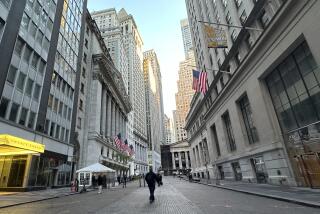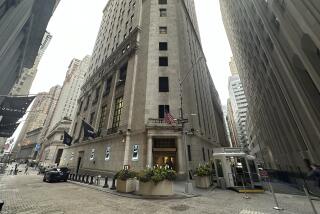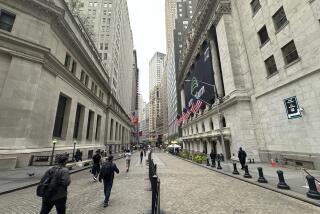FINANCIAL MARKETS : Dow Falls 22.83 on Jobs Report, Soviet Worries
NEW YORK — Stock prices declined Friday in the face of economic uncertainties and worries over political developments in the Soviet Union.
The Dow Jones index of 30 industrials fell 22.83 to 2,773.25, reducing its gain for the week to 20.05 points.
Declining issues outnumbered advances by about 5 to 3 in nationwide trading of New York Stock Exchange-listed stocks, with 591 up, 931 down and 453 unchanged.
Big Board volume totaled 158.53 million shares, down from 177 million in the previous session. Nationwide, consolidated volume in NYSE-listed issues, including trades in those stocks on regional exchanges and in the over-the-counter market, totaled 191.73 million shares.
The Labor Department reported that the civilian unemployment rate held steady at 5.3% in December. The data showed a smaller-than-expected 142,000 increase in non-farm payroll employment.
Traders in the bond market took that as favorable news, suggesting that the pace of the economy remained sluggish enough to allow the Federal Reserve to consider further moves toward easier credit.
But stock market investors evidently read the figures as a sign that further weakness might be in store for corporate earnings in the months ahead.
Analysts also said the market was unsettled by reports that Soviet leader Mikhail S. Gorbachev canceled foreign engagements to deal with domestic problems.
Several European country funds gave up some of their recent gains on the chance that the Soviet situation might delay or disrupt new trade opportunities in Eastern Europe.
Germany Fund fell 2 3/4 to 17, posting the day’s biggest percentage loss among NYSE issues; Austria Fund was down 1 1/4 at 20 5/8, and Italy Fund lost 3/4 to 15 1/2.
Malaysia Fund, by contrast, gained 1 3/4 to 21 7/8, and First Philippine Fund rose 7/8 to 14 3/4.
Regional telephone stocks sold off in a general flow of money out of the “defensive” issues that gained many followers in late 1989.
Southwestern Bell dropped 3 to 59 1/4; Pacific Telesis fell 1 1/2 to 47 3/4; Bell South lost 1 7/8 to 55 5/8, and Nynex dipped 1 1/8 to 86 3/8.
Losers among other blue chips included General Electric, down 5/8 at 65 5/8; Merck, down 1 5/8 at 77; American Telephone & Telegraph, down 3/4 at 44 5/8, and McDonald’s, down 5/8 at 33 1/4.
International Business Machines, which had been rallying from depressed levels in recent sessions, slipped back 1/4 to 99 3/4.
The reports that Gorbachev had canceled all January meetings sent the Tokyo share index tumbling as much as 622.37 points, but prices regained part of their losses by the close. The 225-share Nikkei index tumbled 438.12 points or 1.13% to close at 38,274.76 after falling 202.99 on Thursday.
Share prices finished slightly lower on London’s stock exchange. The Financial Times 100-share index fell 7.1 points to close at 2,444.5.
CREDIT Bond Prices Tumble Over Inflation Fears Prices of long-term government bonds sank on new inflation fears and the Labor Department’s report that apparently offered no hope of lower interest rates.
The Treasury’s closely watched 30-year bond fell 1/4 point, or $2.50 for every $1,000 in face value. Its yield rose to 8.06% from 8.03% late Thursday.
Shorter-term Treasury yields were mixed.
The federal funds rate, the interest on overnight loans between banks, was quoted at 8.125%, down from 8.215% late Thursday.
In the tax-exempt market, the Bond Buyer index of 40 actively traded municipal bonds was 93 1/16, down 1/8. The average yield to maturity rose to 7.28% from 7.27% late Thursday.
CURRENCY Gold Rises on Events in the Eastern Bloc The dollar staged a turnaround Friday, closing mostly higher in domestic dealings after taking a sharp hit in overseas markets that were focusing on events in Eastern Europe.
Gold prices soared by as much as $9 an ounce. On the Commodity Exchange in New York, gold bullion for current delivery jumped $7.70 to settle at $406.30 an ounce. Republic National Bank in New York quoted a late bid for gold at $406.25 an ounce, up $7.50 from Thursday’s late bid.
The news reports that Gorbachev had canceled January appointments with foreign officials sparked the hike in gold prices and frightened currency markets worldwide.
“So much depends on him keeping peace in the Eastern Bloc and to give enough room for progress to continue,” said Jack Barbanel, managing director of First Global Managers in Princeton, N.J.
While foreign markets focused on Gorbachev’s political health, domestic traders keyed in on the Labor Department’s unemployment report. The addition of 142,000 non-farm jobs was weaker than expected.
“The dollar dropped off rather sharply on the weak number,” said Stephen Flanagan, a vice president at Manufacturers Hanover Trust Co. The report gave further fuel to the argument that the U.S. economy is slowing and that the Federal Reserve might move to lower interest rates.
Foreign appetite for dollars is dampened when the yields on U.S. securities decline.
Traders also noted that the Fed entered the market to sell dollars for yen, pushing the dollar lower against the Japanese currency.
A lower dollar will help ensure “we have some advantage in continuing the level of exports (to Japan),” which in turn aids in improving the trade deficit, Barbanel noted.
Despite the negative news, technical factors pushed the dollar higher at the close of trading.
“The volume was high, and trading was somewhat chaotic,” Flanagan said.
In Tokyo, the dollar fell to 144.15 Japanese yen, from 145.20 yen on Thursday. Later in London, it fell to 143.75 yen. In New York, the dollar finished at 144.50 yen, up from 143.65 yen on Thursday.
In London, the British pound rose to $1.6375 from $1.6290 late Thursday. In New York, it cost $1.6350 to buy one pound, unchanged from Thursday.
Gold rose in London to a late bid price of $404.50 an ounce, from $395 bid late Thursday. In Zurich, Switzerland, the metal rose to a closing bid of $405.50, from $395.70 bid late Thursday. Earlier in Hong Kong, gold rose $6.03 to close at a bid $400.92.
Silver prices rose. On New York’s Comex, silver bullion for current delivery settled at $5.318 an ounce, from $5.268 an ounce on Thursday. In London, the metal rose to a late bid price of $5.27 an ounce, from $5.22 bid late Thursday.
COMMODITIES Heating Oil Futures Continue to Fall Heating oil futures prices plunged more than 5 cents a gallon for the second straight day on the New York Mercantile Exchange as warm temperatures in the Northeast flushed speculators from the market.
On other commodity markets, orange juice futures rebounded strongly; precious metals were sharply higher; pork futures surged while cattle futures were mixed, and grains and soybeans were mixed.
Wholesale home heating oil futures settled 2.27 to 5.36 cents lower, with the contract for delivery in February at 67.83 cents a gallon.
West Texas Intermediate crude oil finished 33 to 58 cents lower, with February at 23.08 cents a gallon; unleaded gasoline was 2 to 3.07 cents lower, with February at 62.22 cents a gallon.
Tables begin on D5
More to Read
Inside the business of entertainment
The Wide Shot brings you news, analysis and insights on everything from streaming wars to production — and what it all means for the future.
You may occasionally receive promotional content from the Los Angeles Times.










